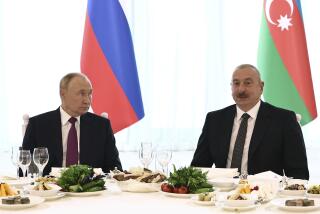Azerbaijan Turns Tap on Offshore Oil
- Share via
BAKU, Azerbaijan — Huge deposits of oil from the former Soviet republic of Azerbaijan began flowing toward world markets Wednesday, fostering hopes that mineral wealth will make the war-ravaged Caucasus region as rich as the Persian Gulf during the 21st century and assure Azerbaijan independence from Moscow.
Watched by U.S. and other Western investors, President Heydar A. Aliyev turned on the tap at an oil platform 80 miles offshore in the Caspian Sea to produce a symbolic first sample of crude. Grinning, he dabbed a little of the viscous black liquid on his cheeks.
“We are on the eve of a very great and prosperous future. We have laid down the foundation for that future today,” said the 74-year-old president.
The nearly $8-billion oil project that came to fruition Wednesday was created with the multinational Azerbaijan International Oil Consortium, or AIOC, in 1994. It already has transformed the country’s capital, Baku, from the shabby backwater of three years ago into a glitzy and optimistic boomtown. The AIOC deal links Azerbaijan to partners that include major U.S. oil companies Amoco, Unocal, Exxon and Pennzoil, which hold a combined 40% stake.
“Azerbaijan has opened more than a pipeline. Azerbaijan has opened a new era of prosperity,” visiting Energy Secretary Federico Pena said during speeches by guests.
In 1994, the deal was a daring demonstration of confidence in Azerbaijan. The country was in turmoil after three years of coups and heavy losses in a conflict with minority Armenians over the disputed Nagorno-Karabakh region.
Since then, however, other Western companies have signed more exploration contracts for oil fields in Azerbaijani waters. In the United States in July, Aliyev signed new contracts worth an estimated $10 billion with Exxon, Chevron, Amoco and Mobil, which aim to tap Azerbaijani oil reserves believed to total as much as 200 billion barrels.
*
Baku already is reaping the benefits. Its Old Town, a walled citadel, is full of elegant new oil-company headquarters built in traditional honey-colored stone. Kebab cafes are facing new competition from Kentucky Fried Chicken outlets, and a city that only three years ago was under a midnight curfew now hums with chic night life in bars with names such as the Wild West and Ragin’ Cajun. Aliyev has nudged the war in Nagorno-Karabakh to a halt, although talks on formally ending it continue and ethnic Armenians control a fifth of Azerbaijan.
Baku is an oil town by tradition. Before oil was struck in the Middle East, Baku’s onshore fields produced the biggest export volume in the world--81 million barrels during a turn-of-the-century boom. Its mineral wealth made it a target of both Communist and White Russian armies during the 1917 Bolshevik Revolution.
Now, for the next five years, 37 million barrels a year of oil will pour out of the new offshore fields; in later years, the flow should reach 110 million barrels a year.
The Azerbaijani economy is registering growth after years of decline, and its financial independence should keep Baku out of Moscow’s clutches.
Russia has spent the past six years trying to reestablish control over mineral resources in former Soviet states, initially weakening them with covert funding to one side in ethnic conflicts and later threatening to withhold energy from its new neighbors unless they signed off on Moscow policies.
Russia admitted this year that it had earlier secretly sent $1 billion worth of weaponry to Armenian separatists in Nagorno-Karabakh, confirming Azerbaijan’s suspicions that Moscow was trying to destabilize it and block the lucrative deal with the West. Aliyev recently blasted Russia for tampering with his region’s politics.
Russia also has tried to renegotiate the status of the Caspian Sea to regain control of its oil. It has sought to have the sea redefined in international law as a lake--which would mean Russia, as a littoral state, would have rights to a portion of Azerbaijan’s coastal oil. But these attempts have come to nothing.
In Baku, Russian First Deputy Premier Boris Y. Nemtsov tried to smooth ruffled feathers with a conciliatory speech and a friendly letter from Russian President Boris N. Yeltsin. But Russia is still smarting over its relatively small stake: The Russian company Lukoil holds 10% of the AIOC, as does Azerbaijan.
Early oil will run in Russian pipelines through Chechnya to the Russian shore of the Black Sea. But an alternative pipeline, farther south through ex-Soviet Georgia, should be ready by late next year. The U.S., the AIOC and Azerbaijan are all pressing for a new route, bypassing Russia altogether and winding up in Turkey.
The subtle political skills of Aliyev, a former Soviet Politburo member, were praised by guests as a key reason for Azerbaijan’s success in linking up with the West.
More to Read
Sign up for Essential California
The most important California stories and recommendations in your inbox every morning.
You may occasionally receive promotional content from the Los Angeles Times.













